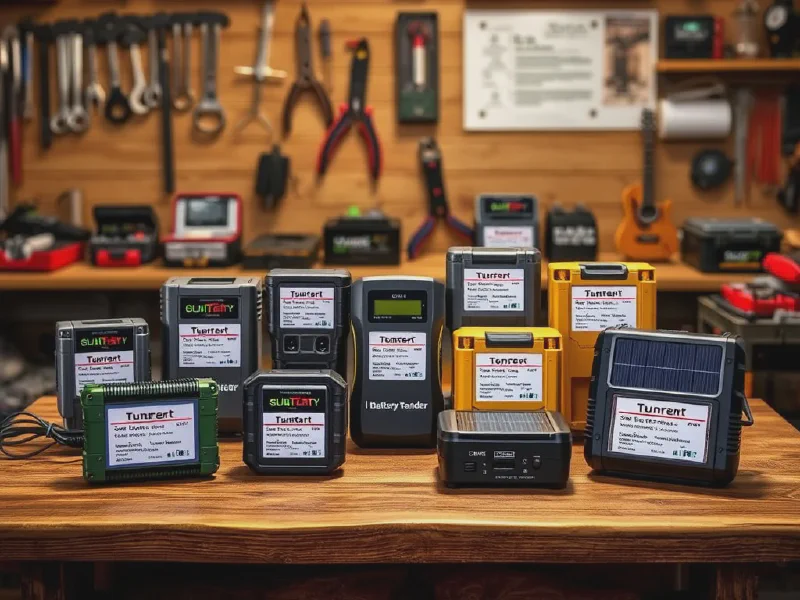Choosing the Best Battery Tender for Your Needs

Battery Tenders: What You Need to Know
Battery tenders are devices designed to keep your vehicle's battery charged and maintained when it's not in use. They are especially useful for vehicles that are stored for long periods, such as classic cars, motorcycles, boats, or RVs. Battery tenders help prevent battery sulfation and keep your battery in optimal condition so that your vehicle is always ready to go. In this article, we will discuss the different types of battery tenders, their features, benefits, and how to choose the best one for your needs.
Types of Battery Tenders
There are three main types of battery tenders: automatic, smart, and float battery tenders.
To maintain your vehicle's battery optimally, consider using a Battery Tender.
Automatic battery tenders are the most common type and are designed to charge and maintain your battery without any manual intervention. They monitor the battery's voltage and automatically adjust the charging rate to prevent overcharging. Automatic battery tenders are easy to use and provide a hands-off approach to battery maintenance.
Smart battery tenders, on the other hand, provide advanced features and functionality. They include microprocessors that analyze the battery's condition and adjust the charging process accordingly. Smart battery tenders offer various charging modes and often have additional features like temperature compensation and diagnostic capabilities.
Types of Battery Tenders
Float battery tenders are designed to keep the battery voltage at a specific level without overcharging. They provide a low current flow to maintain the battery's charge, making them ideal for long-term storage. Float battery tenders are commonly used for marine and RV applications.
Features to Consider
When choosing a battery tender, there are several important features to consider:
Features to Consider
Voltage and Amperage Output: Ensure that the battery tender's voltage and amperage rating matches your battery's requirements. A higher amperage output will charge your battery faster.
Charging Modes: Look for battery tenders with multiple charging modes, such as trickle charge, maintenance mode, or desulfation mode. These modes provide flexibility based on your battery's condition and needs.
Safety Features: Choose a battery tender with built-in safety features like short-circuit protection, reverse polarity protection, and spark-proof connections. These features ensure safe and efficient charging.
Compatibility with Different Battery Types: Check if the battery tender is compatible with your battery type, whether it's a lead-acid battery, AGM battery, or lithium-ion battery.
Size and Portability: Consider the size and portability of the battery tender, especially if you plan to use it for different vehicles or need to transport it.
Benefits of Using a Battery Tender
Maintains Battery Health: Battery tenders keep your battery charged and maintained, preventing sulfation and extending the battery's lifespan.
Extends Battery Life: By maintaining the optimal charge level, battery tenders help prolong the life of your battery, saving you money in the long run.
Prevents Overcharging: Battery tenders automatically adjust the charging rate to avoid overcharging, which can damage your battery and shorten its life.
Convenient and Easy to Use: Battery tenders require minimal setup and provide a hassle-free solution to battery maintenance. Simply connect it to your battery, and it will take care of the rest.
How to Choose the Best Battery Tender
Consider Your Battery Type and Size: Make sure the battery tender is suitable for your battery type and size. Different types of batteries have different charging requirements.
Check Voltage and Amperage Ratings: Verify that the battery tender's voltage and amperage output match your battery's specifications for safe and efficient charging.
Look for Safety Certifications: Choose a battery tender that is tested and certified for safety. Look for certifications like UL, CE, or ETL.
Read Customer Reviews and Ratings: Learning from other users' experiences can help you gauge the performance and reliability of different battery tender models.
Consider Price and Warranty: Compare prices and warranty options to ensure you get the best value for your money. Consider models with longer warranties for added peace of mind.
Battery Tender Maintenance Tips
Regularly Check Battery Connections: Ensure that the battery tender's connections are clean and secure to maintain a reliable charging connection.
Clean the Battery Terminals: Cleaning the battery terminals regularly helps improve conductivity and prevents corrosion.
Monitor Charging Status: Periodically check the battery tender to ensure it is functioning properly and maintaining the battery's charge.
Store the Battery Tender Properly: When not in use, store the battery tender in a cool and dry place away from direct sunlight and extreme temperatures.